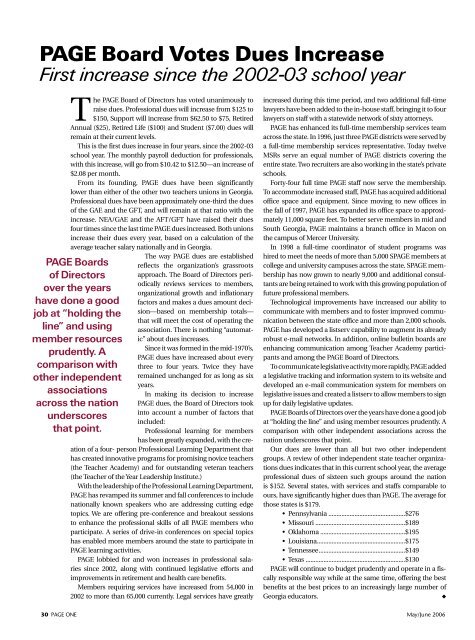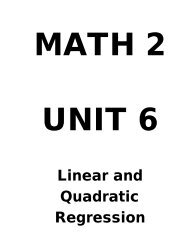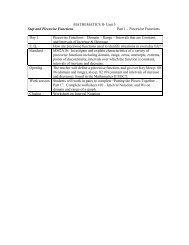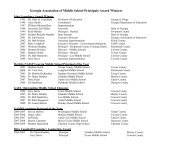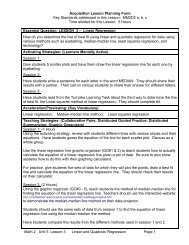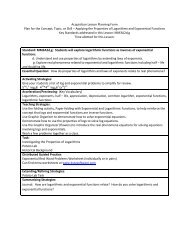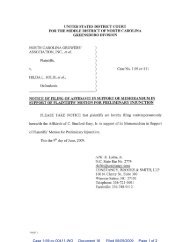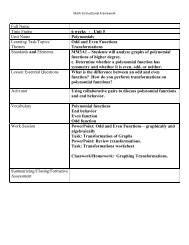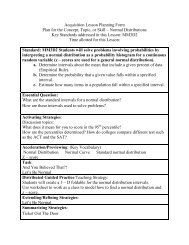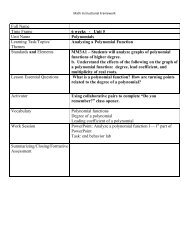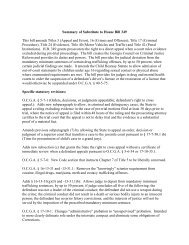Your life doesn't stop - Ciclt.net
Your life doesn't stop - Ciclt.net
Your life doesn't stop - Ciclt.net
You also want an ePaper? Increase the reach of your titles
YUMPU automatically turns print PDFs into web optimized ePapers that Google loves.
PAGE Board Votes Dues Increase<br />
First increase since the 2002-03 school year<br />
The PAGE Board of Directors has voted unanimously to<br />
raise dues. Professional dues will increase from $125 to<br />
$150, Support will increase from $62.50 to $75, Retired<br />
Annual ($25), Retired Life ($100) and Student ($7.00) dues will<br />
remain at their current levels.<br />
This is the first dues increase in four years, since the 2002-03<br />
school year. The monthly payroll deduction for professionals,<br />
with this increase, will go from $10.42 to $12.50—an increase of<br />
$2.08 per month.<br />
From its founding, PAGE dues have been significantly<br />
lower than either of the other two teachers unions in Georgia.<br />
Professional dues have been approximately one-third the dues<br />
of the GAE and the GFT, and will remain at that ratio with the<br />
increase. NEA/GAE and the AFT/GFT have raised their dues<br />
four times since the last time PAGE dues increased. Both unions<br />
increase their dues every year, based on a calculation of the<br />
average teacher salary nationally and in Georgia.<br />
The way PAGE dues are established<br />
reflects the organization’s grassroots<br />
approach. The Board of Directors periodically<br />
reviews services to members,<br />
organizational growth and inflationary<br />
factors and makes a dues amount decision—based<br />
on membership totals—<br />
that will meet the cost of operating the<br />
association. There is nothing “automatic”<br />
about dues increases.<br />
Since it was formed in the mid-1970’s,<br />
PAGE dues have increased about every<br />
three to four years. Twice they have<br />
remained unchanged for as long as six<br />
years.<br />
In making its decision to increase<br />
PAGE dues, the Board of Directors took<br />
into account a number of factors that<br />
included:<br />
Professional learning for members<br />
has been greatly expanded, with the creation<br />
of a four- person Professional Learning Department that<br />
has created innovative programs for promising novice teachers<br />
(the Teacher Academy) and for outstanding veteran teachers<br />
(the Teacher of the Year Leadership Institute.)<br />
With the leadership of the Professional Learning Department,<br />
PAGE has revamped its summer and fall conferences to include<br />
nationally known speakers who are addressing cutting edge<br />
topics. We are offering pre-conference and breakout sessions<br />
to enhance the professional skills of all PAGE members who<br />
participate. A series of drive-in conferences on special topics<br />
has enabled more members around the state to participate in<br />
PAGE learning activities.<br />
PAGE lobbied for and won increases in professional salaries<br />
since 2002, along with continued legislative efforts and<br />
improvements in retirement and health care benefits.<br />
Members requiring services have increased from 54,000 in<br />
2002 to more than 65,000 currently. Legal services have greatly<br />
PAGE Boards<br />
of Directors<br />
over the years<br />
have done a good<br />
job at “holding the<br />
line” and using<br />
member resources<br />
prudently. A<br />
comparison with<br />
other independent<br />
associations<br />
across the nation<br />
underscores<br />
that point.<br />
increased during this time period, and two additional full-time<br />
lawyers have been added to the in-house staff, bringing it to four<br />
lawyers on staff with a statewide <strong>net</strong>work of sixty attorneys.<br />
PAGE has enhanced its full-time membership services team<br />
across the state. In 1996, just three PAGE districts were served by<br />
a full-time membership services representative. Today twelve<br />
MSRs serve an equal number of PAGE districts covering the<br />
entire state. Two recruiters are also working in the state’s private<br />
schools.<br />
Forty-four full time PAGE staff now serve the membership.<br />
To accommodate increased staff, PAGE has acquired additional<br />
office space and equipment. Since moving to new offices in<br />
the fall of 1997, PAGE has expanded its office space to approximately<br />
11,000 square feet. To better serve members in mid and<br />
South Georgia, PAGE maintains a branch office in Macon on<br />
the campus of Mercer University.<br />
In 1998 a full-time coordinator of student programs was<br />
hired to meet the needs of more than 5,000 SPAGE members at<br />
college and university campuses across the state. SPAGE membership<br />
has now grown to nearly 9,000 and additional consultants<br />
are being retained to work with this growing population of<br />
future professional members.<br />
Technological improvements have increased our ability to<br />
communicate with members and to foster improved communication<br />
between the state office and more than 2,000 schools.<br />
PAGE has developed a listserv capability to augment its already<br />
robust e-mail <strong>net</strong>works. In addition, online bulletin boards are<br />
enhancing communication among Teacher Academy participants<br />
and among the PAGE Board of Directors.<br />
To communicate legislative activity more rapidly, PAGE added<br />
a legislative tracking and information system to its website and<br />
developed an e-mail communication system for members on<br />
legislative issues and created a listserv to allow members to sign<br />
up for daily legislative updates.<br />
PAGE Boards of Directors over the years have done a good job<br />
at “holding the line” and using member resources prudently. A<br />
comparison with other independent associations across the<br />
nation underscores that point.<br />
Our dues are lower than all but two other independent<br />
groups. A review of other independent state teacher organizations<br />
dues indicates that in this current school year, the average<br />
professional dues of sixteen such groups around the nation<br />
is $152. Several states, with services and staffs comparable to<br />
ours, have significantly higher dues than PAGE. The average for<br />
those states is $179.<br />
• Pennsylvania ...............................................$276<br />
• Missouri .......................................................$189<br />
• Oklahoma ....................................................$195<br />
• Louisiana ......................................................$175<br />
• Tennessee .....................................................$149<br />
• Texas .............................................................$130<br />
PAGE will continue to budget prudently and operate in a fiscally<br />
responsible way while at the same time, offering the best<br />
benefits at the best prices to an increasingly large number of<br />
Georgia educators.<br />
◆<br />
30 PAGE ONE May/June 2006


